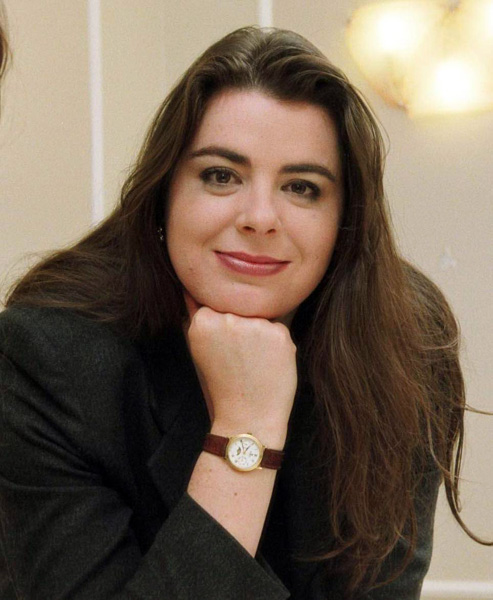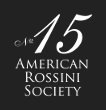Exclusive interview with Daniela Barcellona

Daniela Barcellona, one of the newest members of the Honorary Board of the Friends of the Rossini Opera Festival, is in New York City to perform Malcom at the Metropolitan Opera’s “La Donna Del Lago”.
She graciously agreed to be interviewed at short notice. We asked her to answer in Italian ( it’s a beautiful language, after all)
The English translation was generously provided shortly after that, by Luca Damaschi,as a gesture of friendship to American Rossini fans.
Q. When and how did you discover that you had an affinity for Rossini?
Non è stata proprio una scoperta immediata. Avevo sempre delle “agilità” piuttosto buone ma non conoscevo né il repertorio né la tecnica corretta per affrontarlo. L’occasione si è presentata quando il mio maestro di canto, Alessandro Vitiello, mi ha proposto, data la mia giovane età, di affrontare lo studio dell’ “Italiana in Algeri”. Oltre le richieste tecniche che il ruolo richiede, mi ha permesso di conoscere un mondo che, per me, era quasi sconosciuto; prima, infatti, vedevo solo l’esteriorità e la spettacolarità del canto rossiniano, non comprendendo ancora l’espressività nascosta dietro le cadenze e le agilità.
A questo sono arrivata gradualmente, soprattutto affrontando il Rossini serio, ed anche grazie all’aiuto del Maestro Gelmetti, uno dei pochissimi interpreti in grado di riconoscere la poetica rossiniana nascosta dietro quello che potrebbe sembrare solamente un artificio vocale, meramente spettacolare e fine a se stesso.
Questa visione mi ha aperto un mondo, facendomi capire che la musica rossiniana, lungi dall’essere una banale dimostrazione di bravura tecnica, era invece fondata sull’espressività e sulle emozioni più intime.
It was not an immediate discovery. I have always had rather good “agilità”, but I did not know nor the repertoire nor the technique to sing it. The occasion arrived when, in consideration of my early age, my singer-teacher, Alessandro Vitiello proposed me to start to study “Italiana in Algeri”. In addition to the techiques that such a role required, that opera made me know a world that was for me almost unknown; before such experience, in fact, I just saw the outward appearance and the spectacularity of the Rossinian singing, as I did not yet understand the expressiveness hidden behind cadenzas and agilità (coloraturas). I gradually arrived at this, in particular by singing the “opera seria” by Rossini. For this I have also to thank Maestro Gelmetti, one of the very rare interpreter able to recognize the Rossinian poetics hidden behind what that could seem a vocal artifice, merely spectacular and end in itself. This vision opened a world to me. It made me understand that the music by Rossini was based on expressiveness and more intimate emotions and was not just a banal demonstration of bravura technique
Q. Did you already know that this was going to be a specialty for you when you attended the Accademia Rossinia?
Assolutamente no. Quello è stato l’unico anno in cui l’Accademia era affidata al Maestro Gelmetti ed è stata proprio l’occasione in cui l’ho conosciuto; ho avuto la fortuna di lavorare subito con lui come allieva e, proprio in quel frangente, ho avuto la possibilità di scoprire, grazie a lui, “un altro rossini”, moderno ed espressivo. Ultimata quell’esperienza, il Maestro Gelmetti mi ha subito richiesta per alcuni concerti… Poi, per la Semiramide a Ginevra ed il Tancredi a Pesaro, nel 1999. Il resto lo sapete.
Absolutely not. That was the only year when the Accademia was in charge to Maestro Gelmetti and it was exactly the occasion when I met him; I had the chance to work soon with him as a pupil and precisely in that situation, I had the possibility to discover thanks to him “a different Rossini”, modern and expressive. Terminated such experience with Maestro Gelmetti, he immediately requested me for some concerts… Then, Semiramide in Geneva and Tancredi in Pesaro, in 1999. The rest, you know.
Q. You sang in the 2001 ROF production of La Donna Del Lago. Had you sung Malcom before?
Quello è stato il mio debutto (prima avevo solamente cantato la prima aria in concerto).
That was my debut (earlier I had just sung the first aria as a concert)
Q. It was quite a cast, but the recording from the premier seem to indicate that the audience went totally wild over your performance. Were you surprised?
Devo ammettere di sì. Era il secondo grande ruolo che affrontavo a Pesaro ed il primo in uno spazio grande come il Palafestival… Aggiungiamo pure che Malcolm non è il protagonista assoluto dell’opera e, quel cast, vantava i nomi più importanti della lirica mondiale… Quindi, sì: sono rimasta sorpresa ed onorata.
I freely admit yes. It was the second great role that I played in Pesaro and it was the first in such a large space as the Palafestival….Let’s also add that Malcom is not the main character and that such cast was composed by the most important names in the world opera…so, yes: I was very surprised and honoured.
Q. How has your understanding of Malcom evolved over the years and/or does it depend on the other singers?
L’evoluzione della mia interpretazione dipende soprattutto dalla possibilità di riaffrontare il ruolo: in queste occasioni, infatti, mi impongo di ristudiare tutto dal principio, come se si trattasse di un debutto.
Questo mi permette di cogliere delle sfumature che, magari, precedentemente mi erano sfuggite ma, soprattutto, mi permette di adattare il ruolo alla mia evoluzione artistica e fisica (gli anni passano per tutti 🙂 ). Importante, almeno per me, è la possibilità di ristudiare il ruolo con il medesimo Maestro con cui l’ho affrontato la prima volta: Alessandro Vitiello… Possiamo dire che ogni personaggio è un po’ figlio di entrambi e, rivederlo assieme, mi consente di avere una visione più completa. Dal punto di vista scenico, invece, mi affido completamente al regista con cui collaboro e devo dire di aver sempre avuto la fortuna di trovare degli artisti che, compresa la mia idea del ruolo, mi hanno aiutato a renderlo più reale.
The evolution of my interpretation depends first of all on the possibility to play again the role: in these occasions, in fact, I impose myself to study again everything from the beginning, as if it was my debut. In this way I can capture some of the most suggestive shades, sometimes, previously escaped and in particular I can adapt the role to my artistic and physical evolution (all of us get older). It is important, at least for me, the possibility to study again the role with the same Maestro with whom I did it the first time: Alessandro Vitellio…We can say that the character is, in a certain way, the son of both and to see the character together make me have a more complete vision. From the scenic point of view, on the contrary, I totally trust the director and I freely admit that I was always lucky as I found artists able to understand the idea that I had of my role and helped me to make it more real.
Q. What is your favorite Rossini role?
Solitamente, il ruolo che sto affrontando 🙂 Tutti i personaggi rossiniani sono talmente belli e ben delineati che è difficile avere una preferenza. Ad ogni modo, sono particolarmente affezionata a Tancredi, l’opera con la quale ho iniziato la mia carriera: forse, fra tutti gli eroi di Rossini, è quello più umano e più poetico.
On general basis, the role that I am playing. All Rossinian characters are so beautiful and well outlined that it is difficult to prefer one. In any case, I am very fond of Tancredi, the opera which made my career start: perhaps among the Rossini’s heros, he is the most human and poetic.
Q. You sang Tancredi in a concert version at ROF a few years ago. Again, the audience was thrilled. Hopefully you felt their enthusiasm. Is that part of the joy of being an artist?
Quella è la gioia più grande, perché è la prova tangibile che il messaggio che volevo trasmettere è stato colto ed apprezzato. E’ come seminare un fiore e vederlo crescere: nel mio piccolo, mi fa capire che tutto il lavoro che sto portando avanti non andrà perso. E la cosa più bella, poi, è incontrare dei giovani cantanti che mi dicono che hanno deciso di iniziare a studiare dopo avermi ascoltata: non posso chiedere di più.
That is the greatest joy, because it is the tangible proof that the message I wanted to transmit was captured and appreciated. It is like to plant a flower and to see it growing: in my small contribution, it makes me understand that my work will not be lost. And the most beautiful thing, then, is to meet young singers that tell me they started studying after listening to me: I cannot ask more.
We would like to thank Daniela Barcellona for sharing these thoughts with us. She is not merely a star, but clearly an artist.
